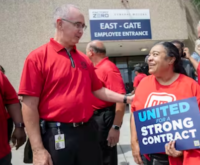By ALAN SCHER ZAGIER
Associated Press
ST. LOUIS (AP) _ African-style hair braiders in Missouri, Arkansas and Washington are challenging state cosmetology licensing requirements as part of a coordinated legal campaign by a national foundation that opposes increased government regulation of street vendors, florists and other small businesses.
The Virginia-based Institute for Justice says its Braiding Freedom Initiative has won similar legal, administrative or legislative challenges in seven other states, including Ohio, California and Utah, where in August 2012 a federal judge called the state’s licensing requirement unconstitutional.
In Missouri, Joba Hair Braiding owner Ndioba Niang, a native of Senegal who later lived in France, said she completed 1,000 of the required 3,000 hours of cosmetology training at a cost of thousands of dollars before dropping out.
The preparation covers sanitation, chemical use and other aspects of the beauty industry, but excludes any preparation in traditional African braiding techniques its practitioners say date back thousands of years and is both an art form and a means of cultural expression. As interracial adoptions increase, the hair styling can also be a lifeline for parents who are not African-American and are unprepared to care for their children’s thick locks.
Tameka Stigers, 33, braided hair out of her home for five years before opening Locs of Glory in a St. Louis storefront three weeks ago, inspired by what she calls increased interest among black women in natural, chemical-free hair styles replete with intricate twists, folds and knots _ but fearful that state inspectors could come calling. A typical braiding costs several hundreds of dollars and requires hours of work, usually spread out over several days or weeks.
“The way the rules are written are unfair and unnecessary,” said Stigers, who with Niang are the Missouri plaintiffs in a federal lawsuit filed Monday in St. Louis. The suit names the six members of the Missouri Board of Cosmetology and Barber Examiners along with its executive director, who through a spokesman declined comment.
The state agency responded to a request for details on how frequently it enforces the licensing law for hair braiders, and information on fine amounts, cease and desist letters or other punishment doled out, by referring an Associated Press reporter to an online list of the board’s disciplinary actions. The list of businesses with revoked licenses includes 10 in St. Louis that appear to have offered hair braiding, though most of the listed names of individuals and businesses didn’t offer such details.
The libertarian legal institute, which counts private property rights and school choice among its key issues, frames its advocacy of hair braiders as one of simple economic fairness. The group aggressively tracks what it says are more than 1,100 different occupations that require a government license in at least one state, including auctioneers; earth drillers, milk samplers, and taxidermists.
Attorney Greg Reed said that such occupational licensing laws are “an incredible barrier for any entrepreneur pursuing the American dream” and notes that the Missouri requirement involves more training hours for aspiring beauticians than emergency medical technicians _ without a concurrent level of responsibility for protecting public health and safety.
In Washington, where the state requires hair braiders to study for 1,600 hours and pass two exams, the federal lawsuit filed Tuesday follows a similar suit by the institute a decade ago. Its attorneys say the state agreed to exempt hair braiders from cosmetology licensing laws but has gone back on that promise.
___
Online: Institute for Justice, Braiding Freedom Initiative: www.braidingfreedom.org








